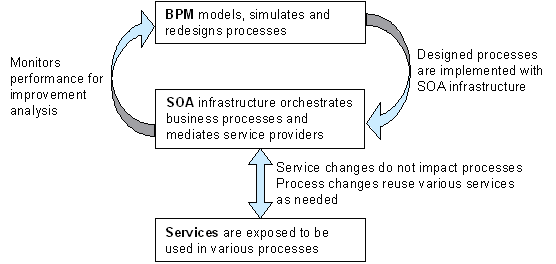The increasing success and ease of global competition places unprecedented pressures on enterprise revenues and profitability. The result is that enterprises are trying to do multiple things at once. Business units are told to be flexible and deliver new services quickly but at the same time to lower operational costs. Enterprises have mandates to continuously change and improve their processes, yet are also need to reuse existing business automation. Many enterprises are arriving at the conclusion that they need flexible automation of dynamic process to achieve these seemingly conflicting goals.
Let us examine what that means. Flexible automation occurs when automated business functions or services are used and reused in different ways at different times. It is a fundamental shift away from traditional automation where the thinking is “code it once, repeat forever.”
Implementing this flexible automation hinges on IT’s ability to decouple three things from each other business services and applications built to automate specific tasks or functions from the integration implementation that allow these applications to communicate. Thus, changes to a particular service or application do not affect the integration implementation and similarly changes to the integration implementation do not affect existing services or applications.
A standards-based SOA provides the technical specifics and design principles to transform existing computing assets into reusable services able to easily integrate and change as required by the modeled process. SOA’s are not a new concept, what is new is the broad acceptance of Web Services standards on which to base the implementation. Without these standards enterprises will rapidly find themselves back in a tangled mess of integration spaghetti. With a standards-based SOA, it is possible for any information resource to be loosely integrated with and be reused by process. It provides IT with the ability to implement process changes rapidly while reusing existing automation schemes in a flexible manner.
Yet this flexible automation alone cannot achieve the full goal of dynamic processes. Dynamic processes have other specific characteristics. They are well documented, linked to monitors that determine the actual performance of the process in the enterprise, can be analyzed to identify improvements and can be changed to implement the found improvements. Achieving these characteristics is not the purview of a SOA, however, they are closely linked to it. SOAs implement the process models and changes to that model. SOA services and integration infrastructure collect performance data that should be linked to the process model.
A quick perusal of today’s business process management suites shows how far the market has come from the basics of drawing process diagrams. BPM is becoming a comprehensive solution that automatically models, monitors, simulates, and redesigns processes to provide competitive advantage. Today’s BPM suites enable an operational environment of integrated human and automated workflows that can adapt to events and operational outcomes. The end result increases the flexibility in business operations. The business is now able to adapt operations to respond appropriately and competitively to changes in their position vis-à-vis the competition. Yet BPM benefits hinge on IT’s ability to implement the process changes within the available infrastructure at the same pace as changes can be made to the process model.
When used together, SOA and BPM allow the enterprise achieve process flexibility by reusing existing automation. SOA makes the connection between process design and process implementation an operational reality (see Figure). Enterprises can use BPM suites to adapt to their process design while SOA allows IT to implement those process changes at the speed needed by the enterprise.
Figure: Relationship between BPM and SOA

Therefore, business process automation becomes focused on creating services reusable in many different ways in multiple processes that can be continuously improved, instead of simply automating an endlessly repeating static function. Enterprises with dynamic and continuously improving processes can achieve dramatic improvements in market capture, cost effectiveness, and profitability through rapid resource reallocation in response to changing business conditions.
Enterprises can thereby enjoy essentially unbounded, process flexibility without losing the cost efficiencies of process automation. The process management solution
The result will be a management solution that can adapt and change automated processes in response to the outcomes of a specific task, or notification of specific events, or even notification upon the recognition of an emerging trend. Thus enterprises can adapt their core, value-added processes with unprecedented speed allowing the company to act appropriately and competitively regardless of the situation. Becoming both competitively agile and cost efficient can be a realistic goal for enterprises that effectively combine SOA and BPM concepts and solutions.
















